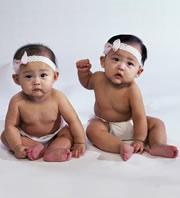 Twin peak: is the rise in double births down to dairy?© Punchstock
Twin peak: is the rise in double births down to dairy?© PunchstockEating milk and other dairy products could increase a woman's chance of having twins, a US doctor is proposing, based on a study of vegan women.
The rate of twin births in the United States rose by more than 75% between 1980 and 2003. Some of this can be explained by the use of fertility treatments, which ups the risk of multiple births. But that can't explain all of the jump, researchers say. Bearing twins is more risky for both mother and child than having a single baby, so scientists want to know what's causing the rise.
Gary Steinman of the Long Island Jewish Medical Center in New Hyde Park, New York, carried out a simple comparison: he gathered together childbearing records for more than 1,000 vegan women who do not eat any animal products. He calculated that vegans were around five times less likely to bear twins than omnivorous women or vegetarians who eat dairy food. His study is published in the Journal of Reproductive Medicine1.
Double trouble
Steinman suggests that the difference in the rate of twin production boils down to the difference in diet. He suggests that animal-product foodstuffs, in particular dairy foods, could boost the production of a protein called insulin-like growth factor (IGF) in women. This could promote the release of eggs by the ovary, so that two are more likely to be fertilized at the same time. There has been an increased use of growth hormones in dairy cows, he says, which may have had an impact on this.
Although the study is preliminary, Steinman points to other evidence to back up his idea. Some research has shown that vegan women's levels of IGF are lower than those of other women2; another suggested that the rate of twin production is higher in countries that consume more milk3.
The hypothesis is interesting, says Paul Haggerty who studies nutrition, fertility and disease at the Rowett Research Institute in Aberdeen, UK, but there are other reasons that vegan women might bear twins less frequently, he points out. Milk-drinking women could tend to be fatter or better nourished - and heavier women are also more likely to bear twins. Alternatively, there might be other nutrients that vegan women lack.
It is premature for women to change their diet in order to decrease their risk of having twins, Haggerty says: "There are a number of loose ends here."
Watch what you eat
ADVERTISEMENT
Twins tend to run in families, showing that the chance of having them is partly determined by our genes. Older women also bear more twins, so the rise in older mothers, as well as fertility treatments, is pushing up the number of twins being produced.
The notion that diet may play a role is a relatively new one. Other studies have hinted that what we eat could affect twin production. Haggerty published a study earlier this month showing that higher levels of the B vitamin folic acid increases the likelihood of a twin birth among women undergoing in vitro fertilization4, perhaps because the vitamin increases the chance or two embryos surviving.
Pinpointing the nutrients that are most important in producing twins could help stem the rise in twin births. There is nothing women can do about their genetic make-up, but "you can do something about diet," Haggarty says.
Visit our dietofmilkcouldbringtwi.html">newsblog to read and post comments about this story.
